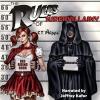I'm not aware of anybody ever using Smersh as a general term for Soviet intelligence: enlighten me.
Down below.
Where? All you've shown me is that some writers confused Smersh for other branches of Soviet intelligence, which is nowhere near the same thing.
I do hate dealing with common names like Ivanova, and Nicolaeva. That makes it that much more difficult to dig up any real sources, or et. al. I keep getting clogged down in various other mentions of the two, unrelated.
Yes, it is a beastly nuisance having to back up unsubstantiated arguments you make with people who know what they're talking about, isn't it? Especially when they were right!

Why not research Cookridge a bit, and you'll then see that he was very unreliable and that there's a reason he's the only person who mentions her?
While Fleming may have used Cookridge as a reference, none of the information being contrasted, up there, comes from Cookridge, to my knowledge.
What do you mean by 'the information being contrasted, up there?' Sorry, I just don't follow what you mean. You said Tatiana was based on a real agent - but she was in fact based on someone Cookridge seems to have invented. You said the training methods reflected real KGB practice: all of the training methods described in FRWL were taken directly from Cookridge, who again seems to have invented them. The only other source to corroborate all his Kuchino training school stuff, for instance, is Ronald Seth, who like Cookridge was a former British agent who wrote several books containing sensationalist and largely invented (and anti-Communist) 'information' about the espionage world. Seth repeated most of Cookridge's claims about the MGB in THE EXECUTIONERS: THE STORY OF SMERSH (1967) - attributing it all to the defunct Smersh, presumably to capitalise on the success of James Bond. He did roughly what you have done, which is to say 'Alright, Smersh was made obsolete, but anything else I find that sounds juicy and interesting can be attributed to them anyway because, well, everyone calls that department Smersh - actually the whole of Soviet intelligence can be called Smersh - actually Smersh still survives in this other department.' John Gardner did this, too. And it's fine in novels, and can be made to sound convincing.

But it doesn't make these books realistic depictions of Soviet intelligence.
Well, the amount of accuracy doesn't really seem a stickler - especially in light of, say, John Vassall, or any of a few others. Or, even Che Guavera. To my knowledge, I can't really place any that would have been used in tandem with assassination, but that doesn't seem all that far-fetched, considering.
The targeting by distance is pretty far-fetched. The targeting of a known field agent ditto. The whole idea that she's in love with him, that the British will know that that's absurd and therefore a trap but not be able to resist... The idea that they would think 'let's trap someone' first and then discuss the whole world until they narrowed it down to Bond. It's enormous fun, but I don't think it's a plausible operation in espionage terms - or even in espionage fiction terms. But this is just a matter of opinion, so I don't think we'll reach agreement on this point.
Granted. But, really - none of the continuation authors have really mastered Fleming's style. I'm sure you'd agree with that.
Of course I would agree with it, as it's the point I've been trying to make.

Fleming didn't care about plots that much, and he had other strengths that over-rode that, so it wasn't really a problem.
However, it's acknowledged that SMERSH was gradually merged with the KGB and/or MGB (March 16, 1946, when SMERSH was merged with the MGB's Third Chief Directoriate), and SMERSH -- the name, itself - was often misused to refer to KGB's Second Main Directoriate's Ninth Section, the Spetsburo. The Spetsburo, "who were, in a word, in charge of terror."
The term was occasionally misused by misinformed writers in the West many years later, but that's an entirely different matter. You claimed that the real-life Smersh undertook similar operations to the one in FRWL. I said Smersh no longer existed and you said, ah, but Soviet intelligence in general was known by the name Smersh. Which is simply not true. Some writers have confused it with others parts of Soviet intelligence - but by that token
your misunderstanding of Smersh means Fleming was rather accurately reflecting Soviet espionage activity!
Additionally, Griswold - who seems to be your source for this (you're a bit vague about what your source is for what piece of information, understandably!) - specifically stated in his book that Fleming's use of Smersh 'appears to be one of artistic licence and a very active imagination'. Which is my point.
Damnation. Do a google search for "The Makings of a Soviet Spy," and it should show up - it's a comparison and contrasting of Fleming's depiction of SMERSH with the reality; it's main objections are to the nature of the characters themselves, and not of any real factual inaccuracy.
I've read it now, thanks. It does indeed conclude that Fleming presented Soviet espionage accurately, but there are lots of articles written on the internet by lots of different people. How about an article by a credible expert on the subject? Why do you feel that the author of this article knows their stuff? They don't. The article has just four sources, other than Fleming's novel, and two of those are not in any way credible: Cookridge and Seth. Much of the article's claim for Fleming's accuracy uses Cookridge, and you used chunks of the argument in your last post, which I already debunked. But as you don't seem to have read the link I provided, here's a bit from Cookridge's SOVIET SPY NET:
'Lt. Colonel Nicolai Godlovsky, director of the Cheka small arms section, is the Soviet rifle marksmanship champion… The training for the budding “executioners” is carried out in a barrack-like building on the corner of Metrostroveskaya Sreet and Turnaninsky Pereulok in Moscow. The director of this training establishment is Colonel of the M.V.D., Arkady Fotoyev. The syllabus includes rifle and pistol shooting, driving (motor-cars and motor-cycles), judo, boxing, photography and elementary courses in radio technique. This course is only for beginners. Graduates of the “Section for Terror and Diversion” are trained at special establishment at Kuchino, a large country house outside Moscow…'
And here's how Fleming used it:
'The next year was spent, with only two other foreign students among several hundred Russians, at the School for Terror and Diversion at Kuchino, outside Moscow. Here Grant went triumphantly through courses in judo, boxing, athletics, photography and radio under the general supervision of the famous Colonel Arkady Fotoyev, father of the modern Soviet spy, and completed his small-arms instruction at the hands of Lieutenant-Colonel Nikolai Godlovsky, the Soviet Rifle Champion.'
If you read both passages carefully, you'll see that Fleming changed around Cookridge's passage, and in doing so inaccurately presents what Cookridge claimed to be the procedure. Cookridge claimed all these activities were just for the beginners in Moscow – that’s actually rather more dramatic. But unfortunately, he didn't go on to reveal what the experts got up to, which left Fleming with a problem as his character is an expert assassin. He got round it simply by listing all the beginners' activities and saying the graduates were taught them at Kuchino. He also got all the authentic-sounding stuff in, all the courses, both instructors, the menacing name of the school and the place it's in, even though it meant directly contradicting his source, Cookridge. Incidentally, the names Godlovsky and Fotoyev have never been cited by any creditable source on Soviet espionage - nor has most of Cookridge's information.
So: Fleming took most of the details about the workings of Soviet espionage in FROM RUSSIA WITH LOVE from Cookridge's SOVIET SPY NET, which was not about Smersh (which no longer existed) but the MGB. Cookridge's book did
not accurately reflect Soviet espionage - and Fleming did not even accurately represent Cookridge's book! FROM RUSSIA WITH LOVE is a brilliant thriller for many reasons, but it was a very long way from being an accurate portrayal of Soviet espionage.
Why don't you just admit that you're talking out of your hat, and we'll shake hands and move onto something else?





